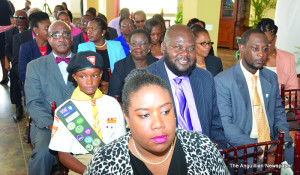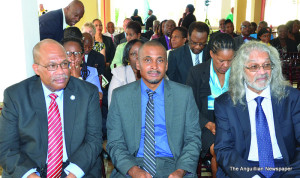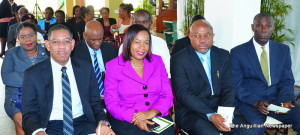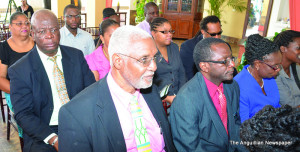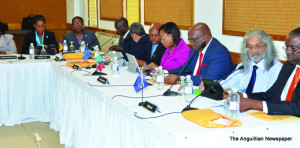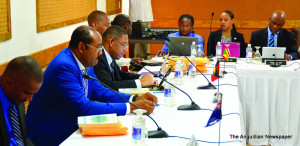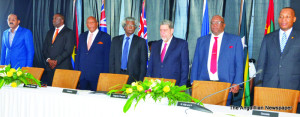
Anguilla’s hospitality was at its best several days ago when the island hosted the Chairmanship Handover Ceremony and 82nd Meeting of the Monetary Council of the Eastern Caribbean Central Bank on Friday, July 24. The venue was La Vue Boutique Hotel and Conference Centre where the management and staff ensured a high degree of excellence in their arrangements and service.


Adding to the formality and exuberance of the occasion, was the splendid performance of the Seventh-day Adventist Pathfinders – the flag bearers for the eight-member island Monetary Council – who escorted the officials inside and outside the building. It was in this setting, at the Handover Ceremony, that the Honourable Chief Minister and Minister of Finance of Anguilla, Mr. Victor Banks, assumed the Chairmanship of the Monetary Council from Dr. Ralph Gonsalves, Chief Minister of Saint Vincent and the Grenadines. It is Mr. Banks’ third term at the helm of the Council between 2000 and 2015.
The welcome remarks were delivered by the Governor of the St. Kitts-based Eastern Caribbean Central Bank, Sir Dwight Venner. He said the leadership required by the members of the Monetary Council, and their counterpart, the OECS Authority, needed to be of the highest quality if they could meet the challenging environment confronting the member countries both individually and collectively.
Sir Dwight continued: “Since the start of the global crisis, this leadership has been exemplary, kept the system from going into extreme crisis and kept the arrangement together. The danger is that we have to be very careful as we begin to be affected by crisis fatigue and are misled by tenuous economic growth both in the international community and within our own countries. This would be dangerous. What we need now is a reaffirmation of our resolve not only to overcome the present challenges, but to make the fundamental changes necessary to achieve the goal of sustainable economic growth and development for our people. I have every confidence that, given our past experience over these years, we will take the road less travelled to a new and exciting era in our history.”
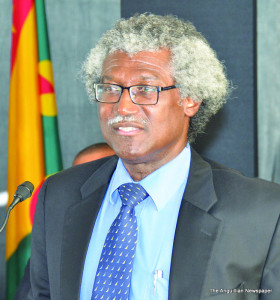
Outgoing Chairman of the Monetary Council, Prime Minister Gonsalves, said in part: “As I handover the Chairmanship of the Monetary Council to my friend, Victor, I want to express my heartfelt thanks to the members of the Monetary Council for their steadfast support as we addressed the significant challenges confronting the Currency Union. The period of my tenure as Chairman of the Monetary Council was one during which we met some real difficulties…
“The Monetary Council, which comprises the Ministers of Finance of the respective member countries, was confronted with very difficult economic questions of national and regional importance. But, as the Governor of the Central Bank pointed out, the Monetary Council stood steadfast in its mandate – to regulate the availability of money and credit; to promote and maintain monetary stability; to promote credit and exchange conditions, and a sound financial structure conducive to the balanced growth of the economies of the territories of the participating governments; and to promote activity through a means consistent with….economic development of the territories. During the period of my chairmanship, there were signs of recovery in the international economy, and some moderate improvements in domestic economies. However, the challenges of financial stability, fiscal and debt sustainability, and growth and competiveness, continued to confront member countries… [These are] challenges that Victor will have to help us to address in a coordinated manner and in an integrated way – not every country for itself.”
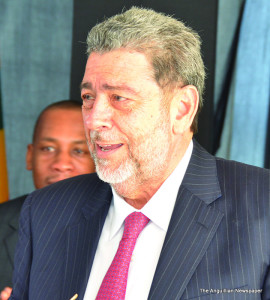
Mr. Gonsalves spoke about other matters, relating to banks, which should be of much interest to Anguillians given the conservatorship of the two local banks.
He went on: “The high level of non-performing loans, the tight liquidity in some banks … required the Monetary Council to focus on programmes for the development of a strong and resilient financial sector…In respect of trying to enhance the resilience of the financial sector, and in keeping with the Central Bank’s mandate to maintain financial stability, the Monetary Council has provided the guidance under resolution for the challenges in the financial sector and on programmes for reforming the financial sector.
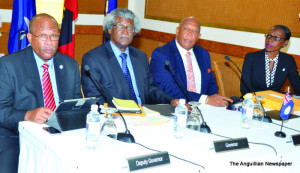
“The Central Bank has therefore engaged in the implementation of a strategy to strengthen the resilience of the financial sector with technical support from the International Monetary Fund, the World Bank and the Caribbean Development Bank…The Monetary Council was apprised of the difficulties in the banking sector based on a comprehensive assessment of the commercial banks… I know that…shareholders in the commercial banks don’t like their banks to be investigated or assessed. But if they are not in good shape, we have to assess them on an onward basis because you are dealing with depositors’ money…
“The Central Bank undertook diagnostics of the commercial banks in the form of stress tests and credit portfolio reviews. This was followed by asset quality reviews which are currently being finalised….The banks that are under the control of the Central Bank, [their] audits were completed to ascertain their financial position. I am confident that we have successfully diagnosed the issues in the commercial banking sector and these exercises were done by highly-trained people… A dynamic modelling exercise is also being carried out to determine the viability of the banks in their existing mode of operations and under various scenarios.”
Mr. Gonsalves further stated: “You have to have a better, stronger legal framework… and, to have a legal framework properly in order, the Monetary Council approved the supporting legislative reforms…You have to put new laws in place to address the existing problems and to make sure that the problems, which have arisen, don’t happen again in the future.”
Gonsalves said the legislative reforms he spoke about included amendments to the Eastern Caribbean Central Bank Agreement Act and to the Banking Uniformed Act itself. He also stated that in the case of high levels of non-performing loans, the Monetary Council guided the Central Bank in the preparation of legislation for the establishment of an Eastern Caribbean Asset Management Corporation for the purchase and management of non-performing loans. He added: “I know the Act has been passed in all of the independent member states of the Currency Union, and it is before the Parliament in St. Kitts and Nevis; and of course we expect Anguilla and Montserrat to follow soon.”
But, in delivering his address accepting the Chairmanship of the Monetary Council, Mr. Banks, Anguilla’s Chief Minister and Minister of Finance, in a well-measured response, made the point that “one size does not fit all”.
The relevant portion of his address is as follows:
“Under my Chairmanship, the immediate priority is to finalise plans for the solution of the challenges facing the banks under the ECCB’s conservatorship, and to implement those plans to ensure that the indigenous banking system across the Union recovers its leading position nationally and regionally and continues to support and facilitate economic opportunity for the people of our region, and helps to stimulate business and wealth creation. All this is to be informed by a number of initiatives taken by the Eastern Caribbean Central Bank.
“As indicated by the outgoing Chairman, much has been undertaken over the past year. The comprehensive exercise to measure the capital requirements of the commercial banks has commenced and is in its final phases of completion. This is something that is very critical. The dynamic model exercise, which provides an indication … of the viability of the commercial banks, has also been commissioned and will soon be completed. So the top priority in the coming months is the need to releave the banks across the region of the conservatorship. This has to be done in a way that is suitable for the countries concerned, respecting the interest of customer, depositors, and with the sustained force of the need to nourish economic growth so vital to our collective wellbeing.
“We all recognise the Central Bank’s desire for a robust and well-functioning legal regulatory framework. The Monetary Council has approved amendments to the Eastern Central Banking Agreement and many member countries have passed, or are in processing of passing, the Bills. Legislation for the establishment of the Eastern Caribbean Asset Management Corporation has also been drafted to address the higher level of non-performing loans.
“The Honourable Ralph Gonsalves, in his presentation, spoke a lot about the need for uniformity in legislation, and it is critical for the survival of the Central Bank that throughout the member states of the Union there is a level of uniformity. But it is obvious that a number of states may have certain critical needs and requirements that may not fit the evolution of legislation under the Banking Act and appropriate for all territories.
“One important element that would have been left out of the discussion is the importance of negotiation. As members of the Monetary Council, we have got to recognise that there are times when our efforts to be uniformed cannot result in a one size fits all. So this is a critically important aspect of the exercise that we, as members of the Monetary Council, must undertake as we caucus today on these very critical issues facing our countries.”
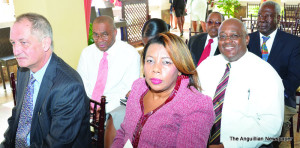
Chief Minister Banks continued: “The situation in my own country, Anguilla, is one which is unlike many other situations in the member states of the Council. We have had two indigenous banks – one starting way back in 1977 and the next one in 1985; and those banks were built by the participation of almost the entire Anguillian society – 3,500 shareholders in the National Bank of Anguilla – and over 65 shareholders in the Caribbean Commercial Bank. And the affinity of the people of Anguilla for our indigenous banks is not based solely on patriotism. It is based on the realities we have faced with our development over the past 35 years. It is important that we recognise that even with these challenges, which we face today, the reason why the banks still exist is because of the loyal support of Anguillians who are not only customers, but owners, of these indigenous banks.
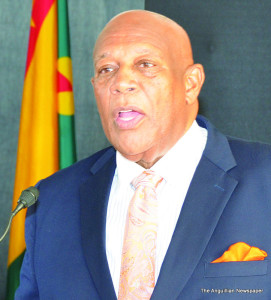
“As we move to our next phase of our development, in a relationship with the Eastern Caribbean Central Bank, we have got to take those issues in account. It is not a theoretical exercise dealing with the legislation, but dealing with aspects of policy relating to the regulation and management of the indigenous banks in Anguilla or the banking sector in Anguilla as a whole.
“For us, it is a real, practical living experience. It means that we have got to make the case that there are certain particular concerns that we have as a people, as a nation, that must be a part of this process. No legislation can be set in stone. There must be the participation of all the member states involved to make sure that their interest [is looked after]. Everybody says all politics is local, and it is. And, as my good friend, Ralph, said, it is not only the technical exercise – it is also a political exercise, and it calls for leadership, for taking tough decisions, but there must be a level of accommodation for some of the issues that are critical.”
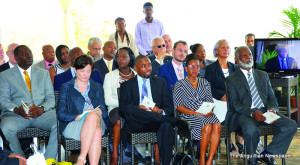 Chief Minister Banks stressed: “As I proceed to the Chairmanship of the Monetary Council, it has to be my responsibility not only to engage with my colleagues on issues affecting the Currency Union and our region – the OECS region on a whole – but also issues affecting my country.”
Chief Minister Banks stressed: “As I proceed to the Chairmanship of the Monetary Council, it has to be my responsibility not only to engage with my colleagues on issues affecting the Currency Union and our region – the OECS region on a whole – but also issues affecting my country.”
The Handover Ceremony concluded with closing remarks by Sir Dwight Venner. He intimated, among other matters, that if conservatorship of banks was an easy job, the process would have already been completed. He said the Central Bank supported national commercial banks, but the issues were whether they were viable, able to protect depositors and whether the model of the banks was the correct one.
The Handover Ceremony was followed by the actual meeting and discussion of the Monetary Council. The agenda was not immediately available.


